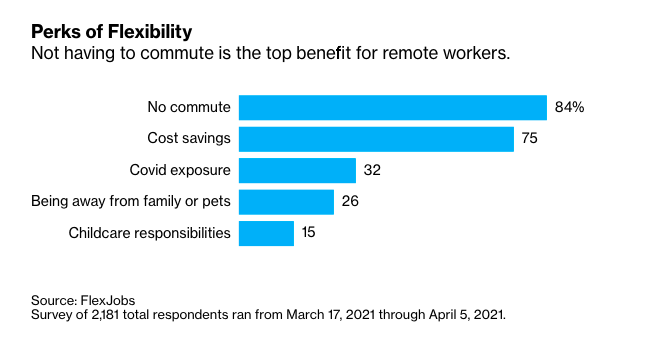What You’re Putting on the Back Burner Could Cost You
After an entire year of studying the impacts of remote work on the metro Atlanta region, Georgia Commute Options has found something that many work-from-home studies aren’t looking at: how the impact of commuting is tied to continued demands for remote work. From April 2020 to April 2021, GCO’s surveys have consistently found that saving money and reduced stress from not commuting are the top two contributors to worker productivity at home. As you continue or begin to plan your strategies for a return to the workplace, there’s one thing you shouldn’t be putting on the back burner: your employees’ commutes.
And, it’s not just our local studies showing this. A recent FlexJobs survey of over 2,100 people found that not having to commute is the top benefit for remote work.
work.
Another fun fact you may not know: a recent JLL study found that employees weren’t as concerned about safety in the office post-COVID as they were about HOW they will get there. Let’s put it into perspective. If all the employees who took transit, carpool and other shared modes prior to the pandemic had to come back into the office every day, and decided to drive alone instead, there would be tens of thousands of individual cars driving into Buckhead. Can you imagine the gridlock? Not only that, it would put all of that stress back on your employees – with a strong chance of decreasing their overall satisfaction and productivity. No one wants this scenario.
It’s safe to say that one thing has proved true: telework is a unique strategy for reducing our traffic congestion and employee stress. And, if you don’t already have something in place, guidelines and standards for your telework program are the key to its success. But it’s not the only strategy. To ensure you have a complete return to office plan, you have to implement the necessary support for how your employees will get back to the office – whether that’s one, two, or five days a week. Because we know that many employees will be working a hybrid schedule for the foreseeable future, monthly parking and monthly transit passes won’t be the ideal commute benefit anymore. The secret to an employer’s support is offering flexibility in commute options, such as daily parking, bike and walk incentives, and 20-trip transit passes, just to name a few.
But here’s our main message: Now is the time. Now is the time for employers to realize that they are responsible for the entire employee experience and that includes employees’ commutes. Essentially, all of us are “relocating” in a way, back to the office. This is your opportunity to create a new culture and provide better solutions for your employees.
Commute benefits and policies should be top of mind – the same level of priority as your health benefits. If you’re not making the connection between employee commutes and your return-to-office plan, you’re missing a vital strategy that could cost you employee satisfaction and productivity. Use this time to implement policies that support your employees, including where, when and how they get to the “office”.





